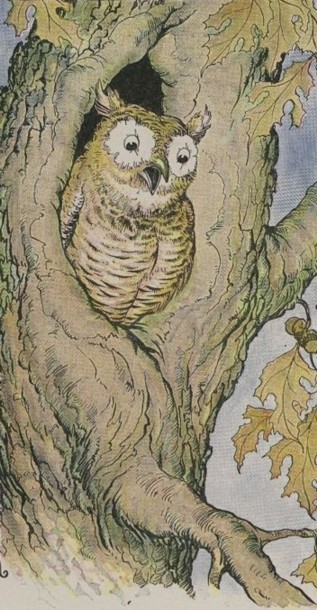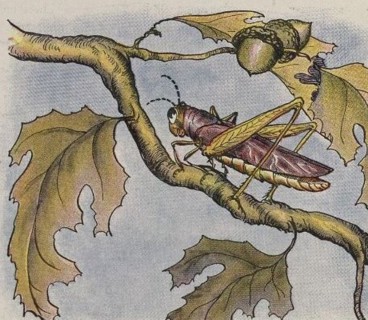| 1. rosy | /ROH-zee/ |
| -pink or pinkish-red | |
| Her cheeks turned rosy just after a few minutes under the sun. | |
| 2. fade | /feyd/ |
| -to lose brightness or vividness of color. | |
| The smile on his face faded after realizing that his wallet was missing. | |
| 3. blink | /blingk/ |
| -to open and close the eye | |
| He blinked with disbelief after hearing unsolicited advice from his colleague. | |
| 4. echo | /EK-oh/ |
| -a sound heard again near its source after being reflected | |
| A student had to check his audio settings because his teacher could hear echoes. | |
| 5. admiration | /ad-muh-REY-shuhn/ |
| -a feeling of wonder, pleasure, or approval. | |
| He won her admiration after learning about his aspirations in life. |


Now there was a certain old Owl who had become very cross and hard to please as she grew older, especially if anything disturbed her daily slumbers. One warm summer afternoon as she dozed away in her den in the old oak tree, a Grasshopper nearby began a joyous but very raspy song. Out popped the old Owl’s head from the opening in the tree that served her both for door and for window.
“Get away from here, sir,” she said to the Grasshopper. “Have you no manners? You should at least respect my age and leave me to sleep in quiet!”
But the Grasshopper answered saucily that he had as much right to his place in the sun as the Owl had to her place in the old oak. Then he struck up a louder and still more rasping tune.
The wise old Owl knew quite well that it would do no good to argue with the Grasshopper, nor with anybody else for that matter. Besides, her eyes were not sharp enough by day to permit her to punish the Grasshopper as he deserved. So she laid aside all hard words and spoke very kindly to him.
“Well sir,” she said, “if I must stay awake, I am going to settle right down to enjoy your singing. Now that I think of it, I have a wonderful wine here, sent me from Olympus, of which I am told Apollo drinks before he sings to the high gods. Please come up and taste this delicious drink with me. I know it will make you sing like Apollo himself.”
The foolish Grasshopper was taken in by the Owl’s flattering words. Up he jumped to the Owl’s den, but as soon as he was near enough so the old Owl could see him clearly, she pounced upon him and ate him up.
Flattery is not a proof of true admiration. Do not let flattery throw you off your guard against an enemy.
| 1. | What do owls like to eat? |
| 2. | Which insect disturbed the Old Owl’s sleep? |
| 3. | How did the Old Owl entice the Grasshopper into its den? |
| 1. | How would you describe the Old Owl? |
| 2. | How would you describe the Grasshopper? |
| 3. | If you were the Old Owl, would you deal with the situation differently? Why or why not? |
| 4. | The fable’s lesson is “Do not let flattery throw you off your guard against an enemy.” Do you agree with this? Why or why not? |
| 5. | How do you know when a compliment is not sincere? |
| Grammar 文法 |
Pronunciation 発音 | Vocabulary 単語 |
Comprehension 理解 |
|
|---|---|---|---|---|
 GOOD GOOD |
文法の誤りはほとんどなく、完全な文章で話すことができる | ほとんどの単語をはっきりと正しく発音することができる | 習った表現を適切に使うことができる | 文章を理解し、質問に正しく答えることができる |
 FAIR |
文法の誤りはあるが、完全な文章で話すことができる | 発音の練習が必要な言葉がいくつかある | たまにミスはあるが、習った表現を適切に使うことができる | 文章を完全に理解するのは難しく、質問に正しく答えられないときもある |
 POOR |
文章で話すのは難しく、単語だけで話すことができる | 発音の練習が必要である | 習った単語と表現を少しだけ使うことができる | 文章を理解するのは難しく、質問に答えるのは難しい |
An eBook from The Project Gutenberg.
This eBook is for the use of anyone anywhere at no cost and with almost no restrictions whatsoever. You may copy it, give it away or re-use it under the terms of the Project Gutenberg License included with this eBook or online at www.gutenberg.org